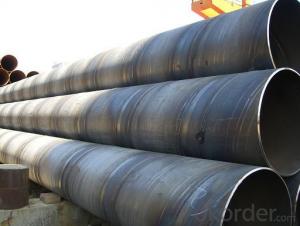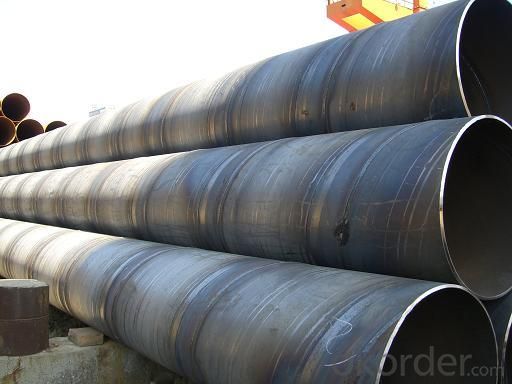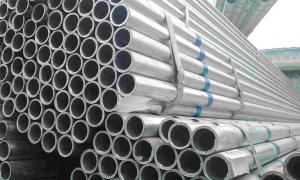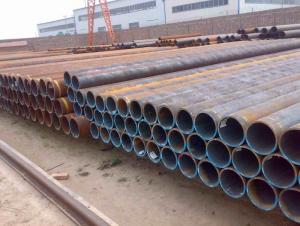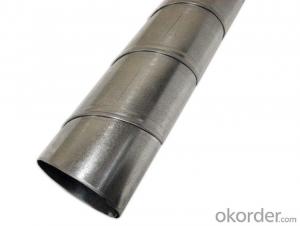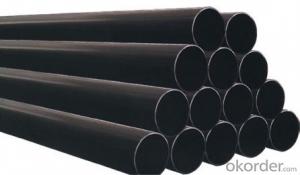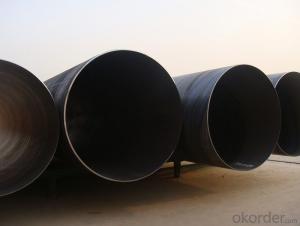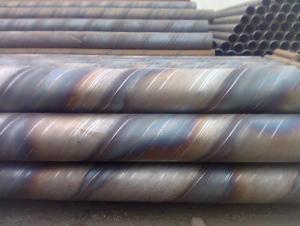SPIRAL WELDED STEEL PIPE 12'' 14‘’CARBON
- Loading Port:
- Tianjin
- Payment Terms:
- TT OR LC
- Min Order Qty:
- 5 m.t
- Supply Capability:
- 3000 m.t/month
OKorder Service Pledge
OKorder Financial Service
You Might Also Like
Packaging & Delivery
Packaging Detail: | standard export packing or as customer's requirement |
Delivery Detail: | within 10 - 30 days |
Specifications
Spiral Welded Steel Pipes and Tubes
1.Material:Q195-Q235
2.Length:1-12m
3.WT:1.0-14mm
4.O.D.:20-273mm
Spiral Welded Steel Pipes and Tubes
Product Description:
1.Material : Q235,Q345,L245,L290,L360,L415,L450,L485,GrB,X42,46,X52,X56,X60,X65,X70,X80,X100
2,Standard: SY/T5037-2000,GB/T9711-2011,API Spec 5L PSL1/PSL2,ASTM A252\A53,ISO3183,DIN17172,EN10217,JIS G3457,AWWA C200,ASTM A139,ASTM A671,ASTM A672
3.Wall thickness: 3.0mm-30mm
4.Outer diameter: φ168mm-3020mm
5,Length: 5m-12m or as your requirement
6,Corrosion protection standard: DIN30670,DIN30671, AWWAC210, AWWA C203, SY/T0413-2002,SY/T0414-2002
7,Application: Oil, gas, natural gas, water pipe, thermal electricity pipe, steel structure engineering, etc
Q195-q345 Material Steel Pipe's Materials
Elements | Chemical Compsition% | Mechanical Property | ||||||
C% | Mn% | S% | P% | Si% | Yield Point (Mpa) | Tensile Strength(Mpa) | Elongation | |
Q195 | 0.06-0.12 | 0.25-0.50 | <0.050< span=""> | <0.045< span=""> | <0.030< span=""> | >195 | 315-430 | 32-33 |
Q215 | 0.09-0.15 | 0.25-0.55 | <0.05< span=""> | <0.045< span=""> | <0.030< span=""> | >215 | 335-450 | 26-31 |
Q235 | 0.12-0.20 | 0.30-0.70 | <0.045< span=""> | <0.045< span=""> | <0.030< span=""> | >235 | 375-500 | 24-26 |
Q345 | <0.20< span=""> | 1.0-1.6 | <0.040< span=""> | <0.040< span=""> | <0.55< span=""> | >345 | 470-630 | 21-22 |
Packaging & Delivery
Packaging Detail: | Normal exporting packing,in container or bulk vessel or as per clients' request |
Delivery Detail: | 2 months after confimed contract |
Specifications
Large Diameter API 5L X70 PSL2 LSAW Steel Pipe
Grade: X42, X46, X50, X52, X60, B, C
OD: 1.5"-28"
WT: SCH10-SCH160
Brand:TPCO
Large Diameter API 5L X70 PSL2 LSAW Steel Pipe
Specifications:
u Standard: API 5L
u Grade: B, C, X42, X46, X50, X52, X56, X60, X65, X70, X80
u OD: 1.5"-28"
u WT: SCH10-SCH160
u Length: 5-12m
u Ends Finish: plain end, bevel end, grooved end
u Surface Treatment: bare, black varnished, oiled finish, red color, anti-corrosion, 3PE, FBE or epoxy coating
u Technique: hot rolled or cold drawn
u Application: api 5l steel pipe for conveying oil, water, gas
u Invoicing: based on theoretical weight or actual weight
u Payment Terms: L/C at sight, T/T or Western Union
u Trade Terms: FOB, CFR, CIF
u Certification: ABS manufacturing assessment, ABS design assessment, API 5CT, API 5L, DNV manufacturer certificate, ISO9001 quality management system certificate, ISO14001 environment management system certificate, GB/T28001 occupational health and safety management system certificate, A1 class manufacturing license of special equipment certificate, CCS, GL, LR, SGS, TüV, PDE
- Q: What are the different types of supports used for steel pipes in buildings?
- There are several different types of supports that are commonly used for steel pipes in buildings. 1. Pipe Hangers: These are specifically designed to support the weight of the pipe and are usually made of metal or plastic material. Pipe hangers are attached to the building structure and hold the pipe in place, preventing it from sagging or moving. 2. Pipe Clamps: These are used to secure the pipe to a wall or other structural element. Pipe clamps typically consist of a metal band that wraps around the pipe and is then secured to the structure with bolts or screws. They provide stability and prevent the pipe from shifting or vibrating. 3. Pipe Shoes: These are support devices that are installed underneath the pipe to distribute the weight evenly and provide additional support. Pipe shoes are typically made of metal or rubber and can be attached to the building structure or embedded in concrete foundations. 4. Pipe Guides: These are used to guide the movement of the pipe and prevent it from shifting or bending excessively. Pipe guides are usually made of metal or plastic and are installed at specific intervals along the length of the pipe. 5. Pipe Rollers: These are used to support horizontal pipes and allow for expansion and contraction due to temperature changes. Pipe rollers are typically made of metal and consist of a series of rollers that the pipe rests on. They allow the pipe to move freely without causing damage to the building structure. It is important to select the appropriate type of support based on the specific requirements of the steel pipe and the building structure. Properly supporting steel pipes in buildings ensures their stability, durability, and overall safety.
- Q: How are steel pipes used in the telecommunications network infrastructure?
- Steel pipes are commonly used in the telecommunications network infrastructure as a means of protecting and housing underground cables. These pipes provide a durable and secure pathway for the cables, safeguarding them from environmental factors such as moisture, extreme temperatures, and physical damage. Additionally, steel pipes offer excellent strength and rigidity, allowing for the installation of multiple cables within a single pipe, thereby reducing costs and simplifying maintenance.
- Q: How are steel pipes used in the construction of high-rise buildings?
- Steel pipes are commonly used in the construction of high-rise buildings for various purposes, including structural support, plumbing, and fire protection. These pipes provide strength and durability to support the weight of the building, allowing for taller structures. They are used to create the building's framework, as well as for the distribution of water, gas, and other utilities throughout the building. Additionally, steel pipes are often used for fire sprinkler systems, providing a reliable and efficient method of fire protection in high-rise buildings.
- Q: Are steel pipes magnetic?
- Yes, steel pipes can be magnetic. Steel, which is primarily composed of iron, is a ferromagnetic material. This means that it can be magnetized or attracted to magnets. However, not all steel pipes are magnetic as the magnetic properties of steel can vary depending on the specific composition and production methods used. In some cases, steel can be made non-magnetic by adding certain alloying elements or by subjecting it to specific heat treatments. Additionally, the strength of the magnetic field that steel pipes can exhibit can vary depending on factors such as the thickness of the pipe and the strength of the magnet being used.
- Q: How are steel pipes insulated for thermal efficiency?
- Steel pipes are insulated for thermal efficiency using various methods such as applying insulation materials like fiberglass, mineral wool, or foam to the surface of the pipes. This insulation helps to prevent heat loss or gain, thereby improving the energy efficiency of the pipes. Additionally, protective outer layers such as aluminum or PVC jackets are often added for extra insulation and to provide resistance against moisture and external elements.
- Q: How are steel pipes used in the transportation of fluids?
- Steel pipes are commonly used in the transportation of fluids due to their durability and strength. They are used to carry various types of liquids and gases, such as water, oil, natural gas, and chemicals. Steel pipes are able to withstand high pressure and temperature, making them ideal for long-distance transportation of fluids. They are widely used in industries like oil and gas, water supply, and sewage systems, providing a reliable and efficient means of fluid transportation.
- Q: How do you protect steel pipes from fire?
- To protect steel pipes from fire, there are several measures that can be taken. One commonly used method is to apply fire-resistant coatings or paints to the surface of the pipes. These coatings or paints are designed to withstand high temperatures and provide a barrier that prevents the heat from reaching the steel. Another effective way to protect steel pipes from fire is to wrap them with fire-resistant insulation materials. These materials act as a buffer, reducing the heat transfer and slowing down the spread of fire. Insulation materials such as mineral wool or ceramic fiber blankets are commonly used for this purpose. In addition, it is important to ensure that the steel pipes are properly installed and supported. This includes maintaining proper clearance from other flammable materials and avoiding overcrowding or obstructions that could impede the flow of air around the pipes. Adequate spacing between pipes is also crucial to prevent the transfer of heat from one pipe to another. Furthermore, it is recommended to incorporate firestop systems when steel pipes pass through fire-rated walls or floors. Firestop systems consist of fire-resistant materials and seals that prevent the spread of fire and smoke through openings or penetrations in fire-rated barriers. Regular maintenance and inspections are essential to ensure the ongoing effectiveness of the fire protection measures. Any damage or deterioration of the coatings, insulation, or firestop systems should be promptly repaired or replaced to maintain the fire resistance of the steel pipes. Overall, a combination of fire-resistant coatings, insulation, proper installation, and maintenance practices are crucial in protecting steel pipes from fire hazards. These measures help to minimize the risk of fire-related damage and ensure the safety of both the pipes and the surrounding environment.
- Q: Can seamless steel pipe and ordinary steel pipe be welded?
- Steel pipe and seamless linking points, you said should refers to ordinary steel pipe joints, if only consider the butt welding problem, two kinds of steel can be welded. But the mechanical properties of the seamless steel pipe and tube with different, generally the main difference is the two kinds of steel can withstand the pressure of the former than the latter to be good.So if your project is seamed steel pipe can be, then the two pipe welding, welding and butt welding interface is completely no problem.
- Q: How do steel pipes perform in earthquake-prone regions?
- Steel pipes perform well in earthquake-prone regions due to their high strength, durability, and flexibility. The inherent properties of steel, such as its ability to absorb energy and distribute stress, make steel pipes resistant to seismic activity. Additionally, steel pipes can be designed and installed with specific measures to further enhance their seismic performance, ensuring the safety and reliability of infrastructure in earthquake-prone areas.
- Q: Can steel pipes be used for underground chemical pipelines?
- Yes, steel pipes can be used for underground chemical pipelines. Steel pipes are known for their durability, strength, and resistance to corrosion, making them suitable for transporting various chemicals underground. However, it is important to consider the specific type of chemical being transported and consult with experts to ensure that the steel pipes are compatible with the chemical composition to avoid any potential reactions or degradation.
Send your message to us
SPIRAL WELDED STEEL PIPE 12'' 14‘’CARBON
- Loading Port:
- Tianjin
- Payment Terms:
- TT OR LC
- Min Order Qty:
- 5 m.t
- Supply Capability:
- 3000 m.t/month
OKorder Service Pledge
OKorder Financial Service
Similar products
Hot products
Hot Searches
Related keywords
